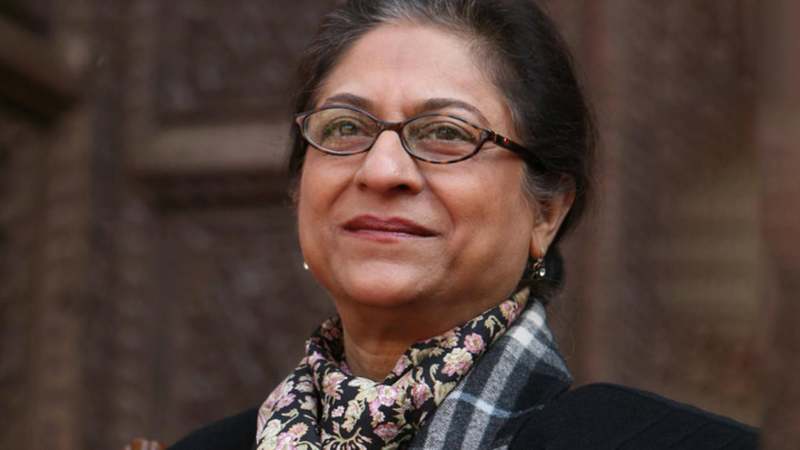This International Human Rights Day we remember Asma Jahangir (1952-2018), an exemplary lawyer who dedicated her life to contesting and defending human rights in her country Pakistan. Her activism, ranging from raising voices against missing persons in conflict zones, skewed nature of the civil-military relationship to women rights, covered nearly all aspects of Pakistan’s socio-political landscape, thus making her a “beacon for a human-friendly society”, as a prominent Pakistani politician described her.
Asma Jahangir had a long and illustrious career and was internationally recognized for her staunch defence for the rule of law. Jahangir was also among the co-founders of the Human Rights Commission of Pakistan, served as a United Nations Special Rapporteur on Freedom of Religion or Belief and served as the first female president of Pakistan’s Supreme Court Bar Association amongst many other positions.
Jahangir began her activist journey at the age of 18 when her father Malik Ghulam Jilani a civil servant and a left-wing activist was jailed for protesting against the military’s daily intervention in civilian matters. Jahangir petitioned and won the bid to release her father when she approached Pakistan’s Supreme Court. Behind her fiery activism lay the contortions that characterized the Pakistani politics in the first few decades of its creation, the biggest episode being the civil war in East Pakistan and the resultant creation of Bangladesh by the end of the 1971 Indo-Pak war.
It was the Pakistan Army’s policy of dealing with dissent in East Pakistan and the ensuing mass violence that continued to haunt Jahangir’s critical outlook towards the skewed civil-military ties. The problems within the civilian leadership notwithstanding, her activism revolved around establishing civilian supremacy not because of any personal proclivity, but due to the fact that civilian regimes would be answerable to its electorate and could technically be conditioned to operate within the confines of the constitution. The same standard of scrutiny became nearly impossible to apply to the Pakistani Army, which successfully used the rivalry with India to consolidate its legitimacy as a kingmaker in Pakistan’s political landscape. At a time when politicians found it nearly impossible to express their resentment against constant interference, Jahangir’s would regularly take to news channels to boldly express her critique on the army’s interference, the plight of women and vestiges of feudalism that continued to shape present-day discourses in Pakistan. At a closer glance, it becomes clear that her activism, in addition to addressing women rights, was a mission dedicated to deconstructing the conventional plebeian understanding that was indifferent or even favourably disposed towards the Army’s intrusions. She was among the few individuals who believed Pakistan would emerge as a more inclusive, tolerant and stronger if led by an accountable civilian establishment.
Asma Jahangir’s career not just as a lawyer but as the leading voice for democracy and protection of human rights, often at personal costs, continues to be a symbol of hope for many who sought to preserve basic human rights in their own countries. She formed the first all-women law firm along with three other associates and by the 1980s emerged as the leading voice against the Hudood Ordinance and blasphemy laws placed by General Zia-ul-Haq. The laws reduced a woman’s testimony to half of that of a man’s and persecution of rape victims if they fail to prove their innocence.
An advocate for religious freedom, Jahangir defended a 14-year-old Christian boy accused of blasphemy and was mercilessly hunted after the fact. Her legal aid cell established a shelter for women called ‘Dastak’ and she also took on numerous cases involving children, women and marginalised communities.
For her work and her vocal criticism of the Pakistani military regimes, she had been arrested, publicly assaulted, threatened and put under house arrest on multiple occasions.
Her principles and vision are perhaps best embodied by the Human Rights Commission of Pakistan whose mandate to this date remains overtly and unapologetically independent and secular. Internationally, she served as the UN Special Rapporteur Freedom of Religion and the situation of human rights in both Iran and Sri Lanka for many years. She co-chaired the South Asia Forum for Human Rights and the vice president of the International Federation for Human Rights. For her work and tireless contribution to the field of humanitarian action, Asma was awarded “Right Livelihood Award” in 2014, the Freedom Award in 2010, the Ramon Magsaysay Award in 2005, Legion of Honour by France and an honorary degree from University of Pennsylvania.
Furthermore, she is remembered for her efforts towards promoting a peaceful South Asian neighbourhood, grounding the possibility of stable Indo-Pak ties in strong adherence to constitutionalism and internationalism rather than being personality-driven ventures. Jahangir passed away from a stoke in February 2018. Her legacy continues to live on through her outstanding contribution to human rights all over Asia.

